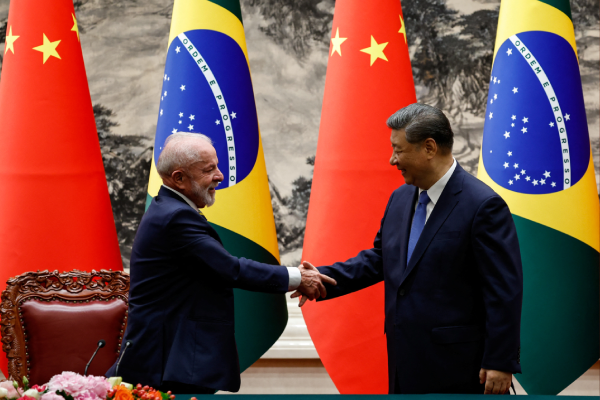China and Brazil have pledged to defend free trade and multilateralism, signing a string of agreements in Beijing to strengthen their ties amid global uncertainty triggered by U.S. President Donald Trump’s import tariffs.
According to local media, Chinese President Xi Jinping told Brazilian President Luiz Inacio Lula da Silva that the two countries should strongly reject unilateralism, protectionism, and “acts of bullying”.
Lula said the two countries’ relations had “never been more necessary”.
“China and Brazil are determined to unite their voices against unilateralism and protectionism,” the Brazilian leftist leader said, according to Brazilian state television.
Lula is in Beijing on a four-day official state visit during which he is attending a high-profile forum in Beijing along with other Latin American and Caribbean officials, including Chile’s President Gabriel Boric and Colombia’s President Gustavo Petro.
Xi and Lula watched on Tuesday as 20 agreements were signed, including highly-anticipated deals for more Brazilian agricultural exports to China.
Currency swap, mining and sustainable nuclear energy deals were also reached.

In a joint statement on the Ukraine crisis released on the same day, the two sides said direct dialogue was the only way to end the conflict between Russia and Ukraine and that they hoped it began as soon as possible.
Lula, a critic of Trump’s trade policies, has sought to boost the South American commodity giant’s exports to China, its largest export market, and to attract Chinese investment.
Read Also
In another joint statement released on Tuesday, the two countries said they recognise the importance of continuing to develop bilateral economic and trade relations, and vowed to strengthen cooperation in agriculture, science and innovation.
Ahead of Lula’s visit, Beijing lifted restrictions for Brazilian soybean shipments from five firms previously suspended over phytosanitary concerns as China sought to pivot away from U.S. imports.
China, which purchases more than 60% of globally traded soybeans, sources over 70% of its imports from Brazil.
The deals covered a broad range of categories, including sustainable aviation fuel, electric vehicles, semiconductors, insulin and coffee beans.
They will meet again in Rio de Janeiro at the BRICS summit in July, with Xi’s attendance confirmed.
Xi is also expected to visit Brazil for the United Nations climate summit in November, which officials expect to include some 1,000 Chinese business leaders.







